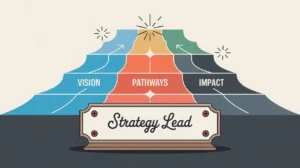What Does the Strategy Officer Role Involve?
A Strategy Officer is responsible for supporting the development, coordination, and implementation of organizational strategies through analytical work, project management, and cross-team collaboration. They help translate leadership priorities into actionable plans, conduct research and analysis, monitor strategic initiatives, and ensure that strategy processes are well organized and data-informed. Their work combines operational execution with strategic thinking to ensure organizational goals are advanced effectively.
In nonprofits and social enterprises, Strategy Officers play a vital role in bridging leadership vision with on-the-ground implementation, helping organizations remain adaptive, evidence-based, and mission-aligned.
At What Level does this Role Operate?
Mid Level: Strategy Officers typically report to a Strategy Lead, Strategy Manager, Director of Strategy, or Chief of Staff. They operate with moderate autonomy, often managing specific strategic projects or analytical workstreams while contributing to broader organizational planning processes. They collaborate across functions, working closely with program, operations, finance, and external relations teams.
Relative Employability: Strategy Officer roles are increasingly common in medium to large nonprofits, international NGOs, foundations, and social enterprises that maintain formal strategy or planning functions. These roles are particularly relevant in organizations pursuing growth, diversification, or transformation.
Relative Pay Scale: Strategy Officers generally occupy the mid pay band, positioned above assistant roles but below lead and managerial positions. Their compensation reflects their analytical responsibilities and operational role in advancing strategic priorities.
What are the Key Responsibilities and Activities?
- Contribute to the development and refinement of organizational and program strategies
- Conduct research and analysis to support decision making and strategic planning
- Manage specific strategy projects or components of larger strategic initiatives
- Translate high-level strategic goals into operational plans, timelines, and deliverables
- Monitor progress on strategic initiatives, collect data, and prepare performance reports
- Draft strategic documents, briefs, and presentations for leadership and board review
- Coordinate cross-functional teams to align activities with strategic priorities
- Support scenario planning, risk assessments, and strategic foresight exercises
- Identify opportunities for process improvement or strategic innovation within the organization
What Core Competencies and Qualifications are Needed?
Required Qualifications and Experience
The following reflect common qualifications and experience expected for this role, while recognizing that pathways may vary by context, organization, and region.
- Relevant academic background in public policy, business, economics, international development, or related fields
- Several years of experience in strategy, consulting, planning, or analytical roles
- Strong research, data analysis, and strategic thinking skills
- Experience supporting cross-functional projects or organizational planning processes
- Familiarity with strategic frameworks, performance tracking, and reporting tools
Key Competencies
- Strategic and analytical thinking
- Strong organizational and project management skills
- Excellent written and verbal communication abilities
- Capacity to work collaboratively across teams and levels
- Attention to detail and ability to synthesize complex information clearly
- Adaptability to changing strategic priorities and contexts
How are AI and Automation Shaping this Role?
An AI-native Strategy Officer can use AI to conduct rapid environmental scans, generate scenario models, and synthesize large volumes of data into actionable insights. AI tools can automate progress tracking, reporting, and research tasks, enabling officers to focus more on interpretation, coordination, and strategic framing. Predictive analytics can also support more proactive planning and risk identification.
What Career Pathways and Transferable Skills are Associated with this Role?
Strategy Officers can progress to roles such as Strategy Lead, Strategy Manager, Director of Strategy, or Chief of Staff. Their skills in analysis, planning, and cross-functional coordination are transferable to senior roles in program strategy, operations, policy, and organizational leadership. Over time, they may lead strategic portfolios, oversee organizational planning functions, or shape strategy at the institutional level.







